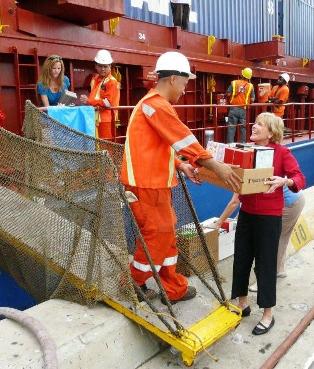Trainee marine engineers, also famously known as junior or 5th engineers on board ships, come on merchant vessels as part of their learning process and also to gain practical knowledge in order to qualify for competitive exams.
Every professional, irrespective of the field, start his/her career from an internship position, an on-site learning process. On ships, the junior engineer is an intern, who is not only excited of this new wonderful world called “ship” but is also equally naive, both professionally and personally.
Often termed as “Alice in wonderland”, “liability”, “useless”, etc. by senior officers on board ship, a junior engineer is like a new born baby who is over-enthusiastic (not always) about learning and exploring almost everything onboard ship. Now though he or she is at the least position of responsibility and cannot be blamed in case of any mishap, the consequences of any wrongdoing can be dangerous to other personnel on ship. For this reason, junior engineers should be properly briefed both before they join the ship and onboard ship by office and ship’s staff.
Every professional, irrespective of the field, start his/her career from an internship position, an on-site learning process. On ships, the junior engineer is an intern, who is not only excited of this new wonderful world called “ship” but is also equally naive, both professionally and personally.
Often termed as “Alice in wonderland”, “liability”, “useless”, etc. by senior officers on board ship, a junior engineer is like a new born baby who is over-enthusiastic (not always) about learning and exploring almost everything onboard ship. Now though he or she is at the least position of responsibility and cannot be blamed in case of any mishap, the consequences of any wrongdoing can be dangerous to other personnel on ship. For this reason, junior engineers should be properly briefed both before they join the ship and onboard ship by office and ship’s staff.
Also, though the responsibility of the junior engineer is of the 2nd engineer of the vessel and the over all in charge is the chief engineer, the junior engineer himself should himself take care of certain things to avoid getting into trouble or causing any kind of dangerous accident.
We have enumerated top 14 points that a junior engineer on ship must not do to avoid landing him or her into any kind of trouble or creating any fatal situation on board ship.
1. Don’t Wander Around on Ship without Informing
Now we know that being new to an interesting place like ship can make anyone highly intriguing; therefore a junior engineer should show some restrain and also should not go to any part of the ship in working and off hours without informing a senior officer.
2. Don’t take any decision related to work without consulting
A junior engineer has been sent to a ship to observe seniors and learn from them. Because of lack of experience, a junior engineer should never take any work related decisions. He must not touch or explore any machinery, switches or valves in the engine room without senior officer’s permission.
3. Don’t Go Onboard Main Deck without Informing
A junior engineer must know how to take care of himself and should give utmost importance to personal safety. He must not go out on the main deck without informing anyone onboard, especially during rough weather.
4. Have Doubts? – Stop there!
Even while working under senior officer, a junior engineer must not take any kind of further actions if he/she is in any kind of doubt regarding the work. Wait, ask, and then proceed.
5. Don’t Take Any Shortcut
It is obvious that anyone who is new to the working environment of the ship might get a bit frustrated and can start avoiding work or taking short cuts. A junior engineer should never indulge in taking any kind of shortcut for he would not be aware of the consequences. Tempted to take a shortcut? Stop! Ask the senior and take a brief break instead.
6. Don’t go to the Shore without informing
As interesting as the ship is to the junior engineer, equally interesting is going out on shore leave when the ship is at ports. A junior engineer should never ever step off the ship without informing seniors, or else it can land him in great trouble. In case he wants shore leave, 2nd engineer or Chief engineer must be asked.
7. Avoid Messing with Environmental Policies
With the rise in awareness around the world regarding marine pollution, environmental policies should be the last thing a junior engineer should mess with, even if he or she is forced by any senior officer. In case of pressure from the senior officer to carry out any kind of mal practice on board ship, the junior engineer should directly inform ship’s captain or chief engineer regarding the issue.
8. Avoid Arguments – Be a Team Player
A ship has very less number of people working on board. They have to stick together through all kind of situations, irrespective of personal and professional differences. A junior engineer should try his best to avoid getting into any kind of argument with the seniors and should make the best out of the golden opportunity he has got to learn and update him or herself.
Respect seniors and fellow crew members, even if they shout or scold, it is for junior engineer’s own good.
9. Don’t Indulge in any kind of Mal Practices
Sometimes monotonous routines or lucrative intentions can provoke a person on board to indulge in mal practices. Being someone who is just starting his or her career, a junior engineer should stay away from all kind of mal practices on board ship in order to prevent threat to the professional career.
10. Don’t Skip Safety Procedure and Life saving equipments
Personal safety should be given utmost importance on ship. A junior engineer should know and learn how to use all personal safety equipments and should never skip any safety procedure, related to both machine safety and personal safety.
11. Don’t Miss Safety Meeting and Drills
Proper training at the start of the career adequately grooms the officer as he forwards on the hierarchy level. A junior engineer should never miss any safety meeting, personal protective equipment training, and drills on board ship. These important sessions play a great role in deciding how an officer will react in times of emergencies.
12. Be Honest – Made a mistake? Admit it!
No one is perfect, and being a junior engineer you are tend to make mistakes. Even if you make a major one, admit the mistake and take the blame. This would not only help you remember the lesson learnt but also prevent any kind of accident that can take place from the same. It would also make seniors respect you!
13. Keep Away from Strangers
When a ship is at port, several people come on board ship for some or the other work. A junior engineer should always be careful whom he or she talks to, for there are people who would try to take undue advantage of your lack of experience. In order to prevent any such incident, do not deal or talk directly with any person coming on board.
14. Shun Restlessness! Practice Patience
A junior engineer should know how to keep his cool for it will help him in the long run to face and tackle emergency situations. Don’t be overenthusiastic and restless. Learn to develop patience as haste will lead you nowhere.
Disclaimer: The authors’ views expressed in this article do not necessarily reflect the views of Merchant Navy Zone. Data and charts, if used, in the article have been sourced from available information and have not been authenticated by any statutory authority. The author and Merchant Navy Zone do not claim it to be accurate nor accept any responsibility for the same. The views constitute only the opinions and do not constitute any guidelines or recommendation on any course of action to be followed by the reader.
The article or images cannot be reproduced, copied, shared or used in any form without the permission of the author and Merchant Navy Zone.

















